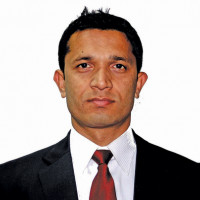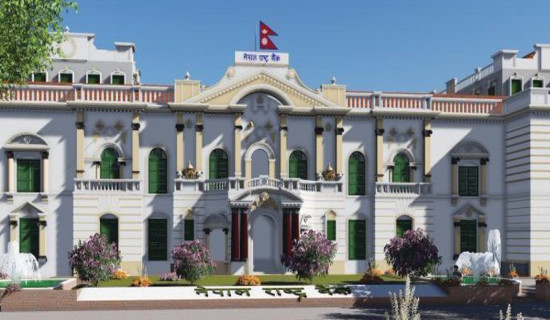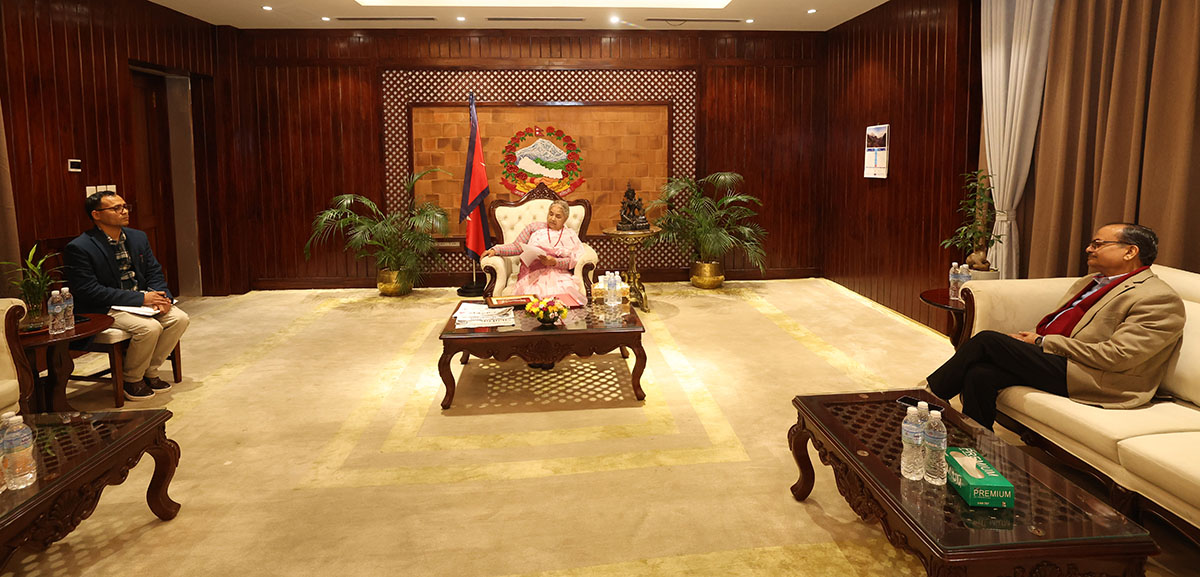- Wednesday, 7 January 2026
Government prepares plan to generate 36,326 MW power by 2040
The government has prepared a new Integrated Power System Development (IPSD) plan with an aim of generating 36,326.9 megawatt electricity and investment requirement of US$ 61.75 billion (NPR 8,249.80 billion) by 2040.
Price stability mustn't disturb growth prospects: RBI Governor
Governor of the Reserve Bank of India (RBI), Shaktikanta Das, has suggested the central banks should take into account the broader growth prospects in their pursuit of price stability. "You must not sacrifice the growth prospects in the name of price stability. The trade-off must not disturb the dyn
Changing Taste Of Teej
Hey, have you turned into a veggie?' one of my friends asked while I moved away from the food stall at a 'Teej Dar' programme without picking up the pieces of roasted chicken, and rather filled an extra bowl with 'Kheer' (rice puddi
Clearance of payment backlog improves budget performance
Mobilisation of development budget has achieved an exponential growth in the current Fiscal Year 2024/25 against the previous year as the progress reached 3.52 per cent of the total allocation of Rs. 352.35 billion in the first 50 days of the year.
FDI inflows fall by two-thirds: NRB
The total Foreign Direct Investment (FDI) stock in Nepal has increased by 11.8 per cent in the Fiscal Year 2022/23 and reached Rs. 295.5 billion but the net FDI inflows to the country has gone down by 67.9 per cent to Rs. 6.0 billion from Rs. 18.6 billion in 2022/23.
Govt plans to complete exploration of five critical minerals within this fiscal
The government is set to complete the exploration of five industrial minerals in various locations across the country within current Fiscal Year 2024/25. According to the Reform Action Plan of the Ministry of Industry, Commerce and Supplies (MoICS), 2081 published by the ministry on Wednesday, exploration of limestone, dolomite, kaolin, phosphorite and iron will be completed by the end of this fiscal, mid-July 2025.
Oman expresses interest to invest in Nepal’s tourism
Oman has expressed its willingness to invest in tourism sector in Nepal. During the meeting with the Minister of Foreign Affairs of Nepal, Dr. Arzu Rana Deuba, her Omani counterpart, Sayyid Badr Hamad Al Busaidi, has given positive indication about investing in the field of tourism in Nepal, Dr. Rana informed journalists after the bilateral meeting.
Nepal can use ample foreign reserves for fruitful projects
The foreign exchange (forex) reserves witnessed exponential growth to reach US$ 15.27 billion by the end of the last Fiscal Year 2023/24, a 28 per cent jump from US$ 11.74 billion a year earlier. The forex reserves are sufficient to cover the imports of goods and services for 13 months, according to the Nepal Rastra Bank (NRB)'s annual report of Current Macroeconomic and Financial Situation of Nepal.
Startup development is govt obligation: PM
Prime Minister KP Sharma Oli has urged the stakeholders from the government, private sector and development partners to facilitate the development of startup enterprises to ensure their contribution to the national aspiration of becoming the middle-income country by 2030.
Nepal seeks more funds for development financing
Deputy Prime Minister and Minister for Finance, Bishnu Prasad Paudel, has expressed the commitment of the government to move ahead in cooperation with the private sector and development partners to meet the development needs in Nepal.
One in five children in Madhes out of school
Out of a 100, about 20 children (up to 17 years of age) in Madhes Province are out of school or college. A more bizarre fact is tha
India's Global Diplomatic Ascendancy
India has never been so clear about its prospective moves globally, and about its prowess as well as its potential contribution to changing the regional and international order. Over the past decade, it has expande
Plan to ink power purchase deal affected
The latest political turmoil in Bangladesh has affected Nepal’s trade with the country that was the 16th largest export market of Nepali goods in the last Fiscal Year 2023/24. About two dozen of trucks and containers carrying Nepali goods to Bangladesh have been stuck at Kakandbhitta (Nepal-India border) and Banglabandh (India-Bangladesh border). Traders are uncertain about the normalcy tha
Reports of all earlier committees on cooperatives missing
The Parliamentary Special Inquiry Committee formed to probe into the recent crisis in the cooperatives sector has faced a difficult time to find the reports of the similar probe committees formed to study the problems of the sector.
Traders express reservations over provisions in new Customs Bill
Traders and exporters have expressed their reservations over the Customs Bill, 2080 while demanding amendments in some administrative and fee-related measures proposed by it. As a new development in this row, Nepal Foreign Trade Association (NFTA), submitted a 22-point disagreement to Santosh Chalise, Chairperson of the Finance Committee of the House of Representatives (HoR) on Sunday morning.













